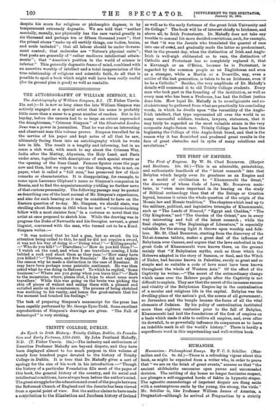TRINITY COLLEGE, DUBLIN.
An Epoch in Irish History : Trinity College, Dublin, its Founda- tion and Early Fortunes, 1591-1660. By John Pentland Mahaffy, D.D. (T. Fisher Unwin. 16s.)—The industry and enthusiasm of Emeritus Professor Mahaffy are beyond dispute, and they have been displayed almost to too much purpose in this volume of nearly four hundred pages devoted to the history of Trinity College in Dublin. It is true that Dr. Mahaffy gives a sort of apology for the size of his work in his introduction :—" Though the history of a particular Foundation fills most of the pages of this book, the general history of the country, and its social and intellectual conditions, have always been before the author's mind. The great struggle for the education and creed of the people between the Reformed Church of England and the Jesuits has been viewed from a special point of view. But the author claims to have made a contribution to the Elizabethan and Jacobean history of Ireland as well as to the early fortunes of the great Irish University and its College." The book will be of interest chiefly to Irishmen, and above all, to Irish Protestants. Dr. Mahaffy does not take any trouble to conceal his more decidedconvictions, such, for example, as that "it was the Jesuits who translated the quarrel of race into one of cread, and gradually made the latter so predominant, that in the present day, when the distinction of Irish and Anglo- Irish is well-nigh obliterated as to race, the distinction of Catholic and Protestant has so completely replaced it, that a Kavanagh or an O'Brien, because he is Protestant, is regarded by the common people as an Englishman and even as a stranger, while a Martin or a Doraville, nay, even a settler of the last generation, is taken to be an Irishman, even if he be a Catholic." Besides, the very amplitude of Dr. Mahaffy's details will commend it to old Trinity College students. Every man who took part in the founding of the institution, as well as every man who has been a Professor, has had the fullest justice done him. How loyal Dr. Mahaffy is to co-religionists and co- students may be gathered from what are practically his concluding words, in which he dwells upon "the versatility of the Anglo- Irish intellect, that type represented all over the world in so many successful soldiers, traders, lawyers, statesmen, that it may fairly be regarded as the most valuable strain in the very composite Anglo-Saxon race. Trinity College has been from the beginning the College of this Anglo-Irish breed, and that is the reason why it has flourished and produced great results in the face of great obstacles and in spite of many rebellions and revolutions."






















































 Previous page
Previous page